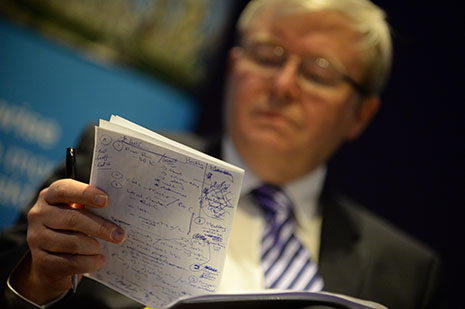THE Labor election campaign of 2007 was slick, professional and ultimately effective, propelling a nerdy but superficially attractive Kevin Rudd into the Lodge on the back of a potent union campaign against the Coalition’s neoliberal industrial relations policy, ironically named WorkChoices.
Any marketing or advertising campaign is, by definition, a highly stylised and highly selective representation of reality; it is not reality itself, just as a map is not the real terrain. To conflate or confuse the two is to invite ridicule and erode credibility.
The immediate objectives of the 2007 campaign were achieved: Labor was in office, Rudd was prime minister, and John Howard and the Coalition were vanquished. But there was a significant downside that started to emerge once the self-congratulatory euphoria faded. The glitz and hyperbole of the Kevin 07 campaign, like the sleep of reason, had bred monsters.
Monster number one was the exaggerated ramping up of expectations and a commensurate failure to manage them. The comic-book appeal of a superhero crossed with the ultimate male fantasy figure of James Bond, unsubtly alluded to in the campaign slogan, was always destined to hit the brick wall of reality sooner or later, and Rudd’s single-handed attempt to meet “the greatest moral challenge of our time” in the form of climate change brought on the inevitable collision. His failure to lead the world at Copenhagen and his abandonment of the emissions trading scheme worked like kryptonite: Kevin 07 really couldn’t fly, it was all a carefully crafted illusion. Here was Nebuchadnezzar’s dream, transposed from Babylon to Canberra:
This image's head was of fine gold, his breast and his arms of silver, his belly and his thighs of brass,
His legs of iron, his feet part of iron and part of clay.
Monster number two was Rudd himself, whose inner circle either could not see or were not game to tell him that his Kevin 07 persona was all illusion and delusion. The story of his gradual estrangement from colleagues, party officials and almost all with whom he had contact is now well known.
But myths die hard. Julia Gillard, among her many mistakes, was deeply remiss in keeping Rudd inside the camp. He was always going to make trouble, as he did in the 2010 campaign, and the Kevin 07 costume was still hanging in the hall closet.
Perhaps the party realistically had little option, given the dire polling, than to move against Gillard. Rudd’s sins were well known in the political beltway, but the punters saw only the courageous man, nursing his wounds and hiding his hurt – the avuncular Kev from Queensland, the aw-shucks guy who would lead again if asked nicely.
The immediate poll bounce was tangible. Were Rudd and Labor really back in with a sniff? Sadly, those who thought so had fallen once again for the Kevin 07 trick. It was never going to be, and the magic dust, sprinkled so liberally, turned out to be political dandruff.
The best thing that can be hoped for in the Labor camp is avoiding a total wipeout. The likely outcome – retaining around sixty seats – will be a respectable advance on how things looked earlier in the year.
The maths are all against any substantial resurgence. The Coalition, for starters, will begin with a notional lead, adding the seats of retiring independents, Tony Windsor and Rob Oakeshott, to its tally. Assuming the Coalition doesn’t lose a seat – normally a risky assumption, but there is little sign of movement in its most marginal seats, like Boothby (SA) and Hasluck (WA), both sitting on 0.6 per cent – it will already hold seventy-five seats out of 150. Labor, for its part, holds nineteen seats requiring a swing of less than 5 per cent to change hands.
The return of Kevin 07, like all sequels, has not matched the original. The Newspoll released on day one of the campaign saw Labor’s vote flatlining while, significantly, Rudd’s approval rating had fallen and his disapproval rating had risen. Has the media saturation been a case of premature over-exposure? Or, even more worrying, has his constant presence, not to mention that brash opportunism evident in his harsh asylum-seeker policies, dulled the lustre of his second coming?
If the aim of returning Rudd was to minimise the losses, then a minimalist objective may well be within reach. But the superhuman goal of turning back three years of dismal polling and wresting the lead back from Abbot and company is more than a little far-fetched. In fact, you would have to believe in superheroes, and nobody believes that. Or do they? •
Norman Abjorensen is at the Crawford School of Public Policy at The Australian National University, and is co-author of Australia: The State of Democracy.




